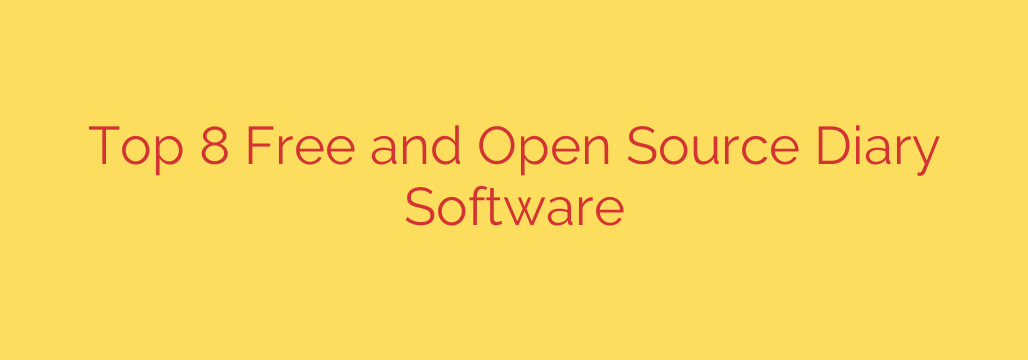
Embracing the habit of keeping a diary or journal offers profound benefits, from tracking personal growth and reflecting on daily events to managing stress and sparking creativity. While traditional paper journals remain popular, digital alternatives provide powerful advantages like search capabilities, organization, backup, and accessibility across devices. Finding the right software, especially options that are free and open source, means you can enjoy these benefits without cost or vendor lock-in, often with strong privacy features. Let’s explore some of the best free and open source diary software available today.
Choosing the ideal digital diary depends on your specific needs, whether you prioritize simplicity, advanced features, cross-device sync, or specific operating system compatibility. Here are some top contenders worth considering for starting your digital journaling journey:
First, consider RedNotebook, a modern and feature-rich desktop diary. It’s perfect for daily writing with features like calendar navigation, customizable templates, text formatting, tagging, and even the ability to embed files. Its search function is robust, making it easy to find past entries. RedNotebook is cross-platform, working on Windows, macOS, and Linux.
Another excellent option is Dia, though perhaps less known purely as a diary app. Often used for diagrams, some versions or related projects offer simple journaling capabilities. It’s essential to check specific forks or companion tools that leverage its structure for dated entries and notes.
For those who prefer a hierarchical note-taking structure that can easily adapt to journaling, CherryTree is a powerful choice. It allows you to organize entries like a tree, with parent and child nodes, making it easy to structure your thoughts by date, topic, or project. It supports rich text, images, files, and has strong search and export functions. It’s also cross-platform.
A straightforward and minimalist option is the Journal software (various applications bear this name, look for simple, dedicated open-source projects). These often focus purely on dated entries with basic text formatting and a clean interface, ideal for those who want zero distractions and just need a place to write daily thoughts. Simplicity is key here, usually offering easy navigation by date.
Tools like Joplin and Obsidian, while primarily note-taking applications, are exceptionally popular for journaling due especially to their markdown support, linking between notes (creating a web of thoughts), and syncing capabilities (often via cloud services like Dropbox, OneDrive, or utilizing end-to-end encryption). They are highly customizable with plugins and themes, and are cross-platform, making them incredibly versatile for serious journalers.
Another strong candidate for secure journaling is Standard Notes. While its extended features require a paid subscription, the free version is a robust, encrypted note-taking app that can be used effectively for private journaling. Its focus on privacy and security with end-to-end encryption is a major draw. It syncs across web, desktop, and mobile platforms.
Some users might find value in simpler, older open-source projects designed specifically for diaries, often offering just dated entries, perhaps basic formatting, and search. These can be great for users with specific system requirements or those who value absolute minimal design.
In summary, whether you need a feature-packed journal with templates and embedded files, a simple interface for daily thoughts, or a highly secure and linkable knowledge base that includes your journal entries, there’s a free and open source digital diary solution that can meet your needs. Exploring these options allows you to find the perfect tool to maintain your personal reflections privately and effectively across your devices.
Source: https://www.linuxlinks.com/diary/








